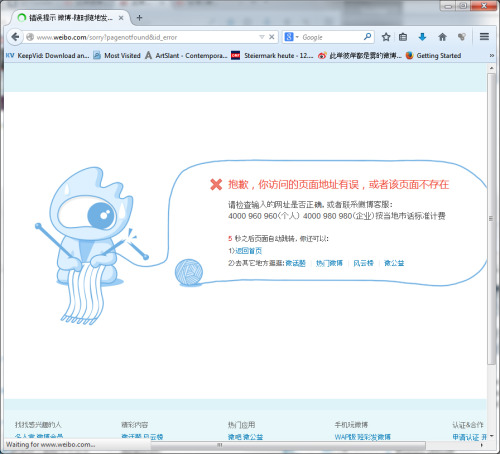This time, watching in safety, I experienced what the rest of the world felt when the tragic event unfolded in Beijing and elsewhere in China then, sympathy, dismay, and anger.
The trigger to the mass protest was Chinese government's forcing Hong Kong citizen to choose from 2-3 pre-approved candidates for chief executive in their 2017 election, making a mockery of their universal suffrage.
Once again, young people led the charge in their attempt to secure a better future for themselves, and social media played a major role, though Chinese government is furiously deleting and blocking the spread of the messages.
Censorship, or self-censorship is nothing new in China, such as I reported before: More Social Media Unavailable, What One Cannot See on Flickr in China. BBC reported that Instagram appears blocked in China and on Weibo (Twitter style Chinese micro-blog), the search result of 香港 (Hong Kong), yielded this message yesterday: "Sorry, the page URL you are looking for is incorrect, or the page does not exist."

Did it mean that Hong Kong was irrelevant to China's economy growth, and international image? Did it mean that Hong Kong no longer existed in the censors' minds? It was an ominous sign.
Carrie Gracie, BBC's China editor, wrote a very thoughtful article: Hong Kong: 10 things Xi Jinping might be thinking, and I could only hope for the best, yet fear for the worst.
New York Times published an article by :
Hong Kong is already a mature, prosperous enclave that has grown relatively immune to the blandishments of mutual prosperity that helped keep it stable for 16 years of Chinese rule. And as a former British colony with its own laws and traditions of liberty, a severe crackdown on mostly peaceful protests would almost certainty backfire here, especially under the glare of international attention.Xi, the new leader who consolidated his personal power through party jockeying and anti-corruption purges, has been trying hard to create a benevolent and open image, greatly aided domestically by his glamorous former singer wife, Peng Liyuan, whose celebrity status and easy manner seduced many oppressed folks in China. However, Xi has never exhibited any inclination to listen to the people so far, therefore I have no reason to hope.
“On the mainland, as long as you can control the streets with enough soldiers and guns, you can kill a protest, because everywhere else is already controlled: the press, the Internet, the schools, every neighborhood and every community,” said Xiao Shu, a mainland writer who is a visiting scholar at National Chengchi University in Taiwan. “In Hong Kong, the streets are not the only battlefield, like on the mainland.”
At the same time, Hong Kong has been under Beijing’s sovereignty for long enough now that even modest concessions could easily send signals across the border that mass protests bring results — something the authorities in Beijing seem determined to prevent, mainland analysts say.
The pressing question is, will Hong Kong become Xi's Tian'anmen Square, Berlin Wall, or his - and by extension - his party's Waterloo?
Take care, Hong Kong!
Related posts on Art · 文化 · Kunst:
- 25 Years Later, Smell of Exhausted Tian'anmen "Warriors" Lingered
- Bloody June Fourth (六四) in Beijing, 23 Years Later
- What One Cannot See on Flickr in China
- Confucius Statue in Tiananmen Square
- Tunisia, Egypt... Who's Next?
- What Chinese People's Daily Reported on Libya Crises
- The Ghost of Mao Zedong
- Facebook in China
- Where Is Ai Weiwei
- Censorship, and Behind the Kitchen Door





No comments:
Post a Comment